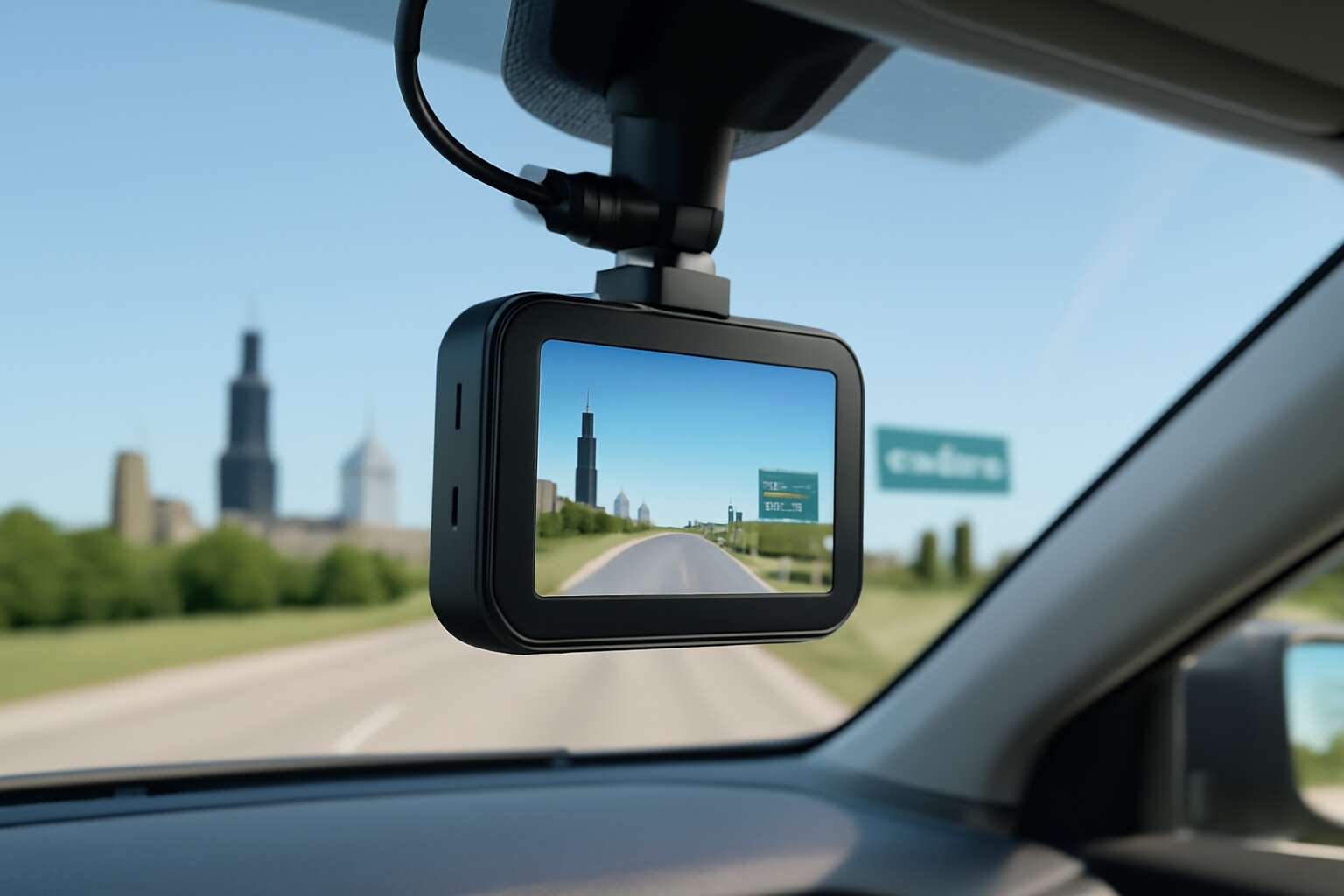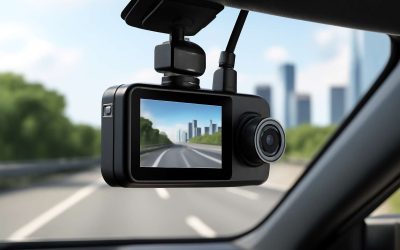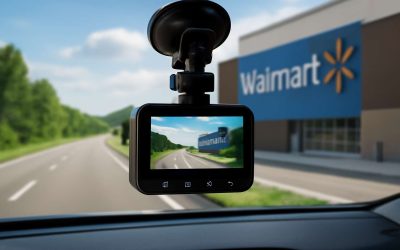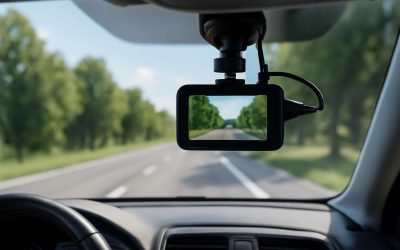Understanding Dash Camera Laws in Illinois
Overview of Illinois Vehicle and Privacy Laws
Many drivers wonder whether dash cameras are legal in Illinois, especially as these devices become more popular for safety and insurance purposes. Illinois law places a significant emphasis on privacy rights, which can sometimes complicate the legality of recording while on the road. The key question remains: are dash cameras legal in Illinois? The answer hinges on understanding how Illinois vehicle and privacy laws intersect.
In Illinois, recording audio without consent can breach privacy laws, since the state is a one-party consent state for audio recordings. This means that as long as one person involved in the conversation consents—often the driver—recording is permissible. However, video recordings alone typically do not violate privacy laws, provided they are captured in public spaces where there is no reasonable expectation of privacy. It’s important to note that Illinois law prohibits recording or eavesdropping on private conversations without consent, which could impact dash camera use if audio is recorded without awareness.
- Public roads are generally fair game for dash camera footage.
- Recording private conversations without consent is illegal in Illinois.
- Using dash cameras to gather evidence must respect privacy boundaries.
Understanding these nuances ensures drivers can use dash cameras legally in Illinois without infringing on privacy rights, making it clear that the legality of dash cameras in Illinois depends heavily on how and what is recorded.
Definition and Types of Dash Cameras
Understanding dash camera laws in Illinois involves more than just knowing if these devices are legal; it requires a grasp of the different types of dash cameras available and how they operate within the state’s legal framework. There are primarily two types of dash cameras: single-lens units that record the road ahead, and dual-lens systems capable of capturing both front and interior footage. These technological marvels can range from basic models to sophisticated devices with GPS tracking and cloud storage, tailored to meet diverse needs.
When considering whether are dash cameras legal in Illinois, it’s crucial to recognise how their features intersect with privacy regulations. For example, while recording video in public spaces is generally permissible, capturing audio—especially conversations—can be a legal grey area. Illinois law is especially sensitive to audio recordings, making it vital to understand the distinction between legal video capture and potentially unlawful audio recordings.
Some drivers opt for dash cameras with discreet, high-definition lenses that blend seamlessly into their vehicle’s interior.
- High-quality video resolution
- Voice-activated controls
- G-sensors for incident detection
These features not only enhance the device’s functionality but also help ensure compliance with Illinois laws. By choosing the right type of dash camera and understanding its legal boundaries, drivers can enjoy the benefits of recording footage without infringing on privacy rights or risking legal repercussions.
Legal Status of Recording While Driving
In Illinois, the question of whether dash cameras are legal in Illinois isn’t just academic—it’s a real concern for drivers eager to protect themselves while navigating the state’s busy roads. Surprisingly, Illinois law doesn’t outright ban dash cameras, but the devil’s in the details. The key issue isn’t just the device itself but what it records and how that footage is used. While capturing video of your commute in public spaces is generally permitted, the legal landscape becomes murkier when audio enters the equation.
Illinois is notably strict about audio recordings, making it a two-tiered challenge for dash camera owners. Recording sound without consent can land you in hot water, especially if you’re not careful. To keep things on the right side of the law, many opt for dash cameras that focus solely on video, sidestepping potential legal pitfalls. Remember, the legality of dash cameras in Illinois hinges on respecting privacy laws—an area where technology and legislation often clash in the most entertaining ways!
Key Illinois Statutes Regarding Video and Audio Recording
In the shadowy corridors of Illinois law, the question lingers: are dash cameras legal in Illinois? The statutes that govern video and audio recording weave a complex tapestry, where legality is often dictated by the silent, watchful eye of privacy. Illinois’s legal framework does not explicitly outlaw dash cameras, but it casts a long, cautious shadow over their use—particularly when audio is involved. This layered legal landscape demands a careful approach, for what is captured can become a legal quagmire.
Legislation such as the Illinois Eavesdropping Act serves as a haunting reminder that secretly recording audio without consent can lead to dire consequences. For those who wish to avoid the darker corners of the law, a common strategy is to focus solely on video recording, sidestepping potential legal pitfalls. When considering if dash cameras are legal in Illinois, it’s essential to understand these subtle distinctions and respect the boundaries set by privacy laws—boundaries that can turn even the most innocent recordings into a legal labyrinth.
Differences Between Public and Private Settings
In Illinois, the legal terrain surrounding dash cameras is as intricate as navigating a maze blindfolded—yet one thing is clear: the distinction between public and private settings can make all the difference. While capturing footage from your vehicle’s dashboard might seem straightforward, the subtle nuances of Illinois law demand a discerning eye. The crux lies in understanding whether your recording involves other individuals and whether audio is part of the equation.
Public spaces, such as roads and highways, generally offer a safer legal harbour for dash camera footage. However, when recordings venture into private property or involve private conversations, the waters become murkier. For example, recording someone inside their home or in a private office without consent can breach privacy statutes. To navigate these turbulent legal waters, consider the following:
- Always focus on video recording alone when in public to sidestep potential privacy violations.
- If audio is recorded, ensure there is clarity that all parties are aware—Illinois’s eavesdropping laws are unforgiving when it comes to secret recordings.
- Be aware that even seemingly innocent footage can become a legal quagmire if it inadvertently captures private moments.
Thus, the answer to “are dash cameras legal in Illinois?” hinges on context, intent, and compliance with privacy statutes. A dash camera might be your trusty sidekick on the road, but wielding it responsibly requires a keen appreciation of Illinois’s legal subtlety—lest your surveillance adventure turn into a legal odyssey.
Legality of Dash Camera Use in Illinois
Are Dash Cameras Permitted for Personal Use?
Amid the bustling streets of Illinois, where every turn and intersection tells a story, the question lingers—are dash cameras legal in Illinois? The answer dances on a delicate line, shimmering with legal nuances and societal norms. These devices, often regarded as guardians of truth, are permitted for personal use, provided they respect the boundaries of privacy and consent. In Illinois, the law allows drivers to record their journeys, but with a keen awareness of audio recording restrictions and the sanctity of private conversations.
For those pondering whether their dash camera can serve as a silent witness, it’s essential to understand the subtle distinctions embedded within state statutes. Personal use of dash cameras is generally permitted, yet recording in private settings or without informing others can lead to legal entanglements. Here’s a quick overview to clarify the landscape:
- Recording in public spaces is typically allowed without explicit consent.
- Audio recording may require one-party consent, aligning with Illinois’ privacy laws.
- Using dash cameras to infringe on private moments could breach privacy statutes, risking legal repercussions.
Ultimately, when considering whether dash cameras are a legal boon or a legal minefield in Illinois, it’s vital to navigate with both curiosity and caution—ensuring your device becomes a tool of protection rather than a source of contention. The question, “are dash cameras legal in Illinois?” remains a nuanced one, echoing the state’s commitment to balancing transparency with privacy.
Audio Recording Laws and Consent Requirements
Understanding the legality of dash cameras in Illinois isn’t merely a matter of technology—it’s a reflection of society’s delicate balance between transparency and privacy. Illinois law permits the use of dash cameras, but the intricacies of audio recording laws introduce an additional layer of complexity. While recording video in public spaces generally falls within legal boundaries, capturing audio involves stricter consent requirements. The state adheres to a one-party consent law, meaning that as long as one person involved in the conversation agrees, the recording is lawful. However, recording private conversations without consent can breach Illinois privacy statutes, risking legal repercussions.
This subtle divergence underscores an essential point: the moral landscape of recording technologies demands vigilance. When deploying a dash camera, especially with audio capabilities, drivers must remain aware of these consent laws to avoid unintentional violations. The line between safeguarding oneself and infringing on another’s privacy is razor-thin, yet crucial to respect. In Illinois, the question “are dash cameras legal in Illinois?” isn’t simply answered with a yes or no—it’s a nuanced dialogue about rights, boundaries, and human trust.
Use of Dash Camera Footage in Legal Proceedings
In Illinois, the legal landscape surrounding dash camera use is as nuanced as the sprawling urban and rural landscapes it captures. While the state generally permits the installation and use of dash cameras, the question of legality extends beyond simple ownership. When it comes to recording footage that could be pivotal in legal proceedings, understanding how Illinois treats dash camera footage is vital for responsible drivers.
In legal disputes, dash camera footage often serves as crucial evidence. Courts tend to view video recordings as objective witnesses—helping to clarify fault in accidents or disputes. However, Illinois law requires that the footage presented in court must adhere to privacy statutes, especially if audio recordings are involved. Ensuring the footage was obtained legally—without infringing on private conversations or private property—is paramount. The legal acceptance of dash camera footage hinges on these delicate boundaries, making it essential for users to understand the specific statutes governing video and audio recordings in Illinois.
Restrictions on Recording Law Enforcement Activities
In Illinois, the question of whether dash cameras are legal in Illinois elicits more than just a straightforward yes or no. It touches on the delicate balance between individual rights and societal interests—especially when it comes to recording law enforcement activities. While dash cameras are generally permitted for personal use, restrictions exist that protect privacy and uphold legal standards.
Specifically, Illinois law prohibits recording audio conversations without the consent of all parties involved, aligning with the state’s strict privacy statutes. This means that while dash cameras are legal in Illinois, their use to record audio during interactions with law enforcement can be legally complex. Violating these restrictions might inadvertently compromise the admissibility of footage in court or lead to legal repercussions.
- Ensure your dash camera setup complies with Illinois privacy laws.
- Avoid recording law enforcement officers without their consent, especially when audio is involved.
- Understand that public spaces generally offer more leeway for recording, but private settings demand greater caution.
Understanding these nuances is vital for responsible drivers. The legal landscape surrounding dash cameras in Illinois isn’t static; it reflects broader societal debates about transparency, privacy, and accountability on our roads. The question of whether dash cameras are legal in Illinois is ultimately about respecting both personal freedoms and the rights of others, including law enforcement officials who serve to uphold the law.
Legal Considerations for Video Sharing and Public Posting
Understanding the legality of dash camera use in Illinois involves more than just knowing whether you can record while driving. When it comes to sharing footage publicly, the waters become even murkier. Illinois law emphasises the importance of privacy, especially concerning audio recordings. It’s crucial to remember that recording someone without their consent — particularly law enforcement officers — can lead to legal complications.
For those wondering, the key considerations for legal video sharing include respecting privacy rights and adhering to state statutes. If you plan to post dash camera footage online, ensure that no private conversations or sensitive information is visible or audible. Violating these privacy standards might not only jeopardise any legal case but could also result in civil or criminal penalties.
- Secure consent before sharing recordings that include private conversations.
- Be cautious about posting footage involving private property or individuals without permission.
- Always review Illinois laws on privacy and recording to avoid unintentional breaches.
Balancing transparency with respect for individual privacy remains at the heart of whether dash cameras are legal in Illinois. While they serve as invaluable tools for accountability and evidence, responsible use and careful sharing are paramount to stay within the bounds of the law and uphold personal rights.
Practical Implications and Best Practices
How to Ensure Compliance with Illinois Laws
Ensuring compliance with Illinois laws while using dash cameras requires a careful balance between technology and privacy. While dash cameras are widely accepted for personal safety and insurance purposes, understanding the legal boundaries is crucial. A key practical implication is respecting the privacy rights of others; recording in public spaces generally poses fewer issues, but capturing footage in private areas can lead to legal complications.
To avoid inadvertent violations, consider implementing best practices such as clearly indicating the presence of a dash camera with visible signage or stickers. This transparency helps mitigate privacy concerns and demonstrates good faith. Additionally, regularly reviewing local legislation will ensure your use of dash cameras remains within legal limits.
For ease of compliance, it’s helpful to follow a structured approach:
- Stay informed about Illinois specific statutes.
- Use dash cameras responsibly, avoiding recording private conversations without consent.
- Limit audio recording to situations where it’s legally permissible.
Following these guidelines helps drivers navigate the legal landscape confidently and keeps dash camera use within the bounds of the law.
Choosing Legally Sound Dash Cameras
Choosing a dash camera that complies with Illinois regulations requires more than just selecting the latest tech; it’s about aligning with legal standards that respect individual privacy and uphold responsible recording practices. Practical implications of using dash cameras include avoiding inadvertent violations, especially when it comes to audio recording. Since Illinois law mandates consent for recording private conversations, responsible users limit audio capture unless explicitly permitted.
Best practices for selecting a legally sound dash camera involve prioritising transparency and respecting privacy boundaries. For example, installing clear signage indicating the presence of a dash camera can foster goodwill and reduce privacy concerns. Additionally, opting for cameras that allow customisation—such as disabling audio recording—helps tailor usage to legal compliance, which is especially critical when considering the question: are dash cameras legal in Illinois?
To navigate these nuances, consider a structured approach:
- Research Illinois-specific legislation thoroughly.
- Use dash cameras responsibly, avoiding private conversations without consent.
- Limit audio recording to situations where it’s legally permissible.
In doing so, drivers and fleet operators can confidently balance technological benefits with the legal landscape, ensuring their dash camera use remains within Illinois law’s boundaries. After all, responsible recording isn’t just about legality; it’s about fostering trust and respect in an increasingly interconnected world.
Securing and Handling Video Footage
In the shadowy corridors of modern technology, where every glance is recorded and every moment captured, the practical implications of securing and handling video footage become paramount. For those questioning, “are dash cameras legal in Illinois?”, understanding how to manage recordings responsibly can prevent unwelcome legal entanglements. Video footage, like a silent witness, holds power — but this power demands careful stewardship.
Proper storage and access controls are essential. Encrypting data, limiting access to authorised personnel, and retaining footage only as long as legally necessary are practices that align with Illinois privacy statutes. When sharing videos, clarity about consent and context can avert accusations of voyeurism or misuse.
For fleet operators and individual drivers alike, a disciplined approach—such as maintaining detailed logs or implementing secure digital repositories—can transform a potential liability into a shield of compliance. After all, respecting the sanctity of privacy while harnessing technological marvels is a delicate dance, one that ensures the dark allure of the dash camera remains a tool of protection rather than peril.
Potential Legal Risks of Non-Compliance
In the labyrinth of modern surveillance, the practical implications of managing dash camera footage are profound. Missteps in handling recordings can morph into legal pitfalls, especially when navigating Illinois’s intricate privacy statutes. The question, “are dash cameras legal in Illinois?” isn’t merely academic; it’s a vital consideration for anyone wielding this technology. Improper storage or careless sharing can inadvertently breach confidentiality, exposing individuals to legal scrutiny or civil liability.
To mitigate potential risks, adopting best practices is essential. For instance, encrypting footage and maintaining meticulous logs of access can serve as shields against accusations of misuse. When disseminating videos, transparency about consent and context is paramount to avoid infringing on privacy rights. Remember, a disciplined approach—embodying restraint and respect—transforms a dash camera from a tool of intrusion into a guardian of lawful integrity.
- Implement robust digital security measures such as encryption and multi-factor authentication
- Limit access to recordings strictly to authorised personnel
- Retain footage only as long as legally required, then securely delete it
Failing to adhere to these principles could expose drivers and fleet operators to legal risks, including charges of voyeurism, invasion of privacy, or misuse of recorded material. The delicate dance between technological innovation and legal compliance requires vigilance—lest the promise of protection turn into an unintended peril.
Tips for Safe and Legal Dash Camera Use
In the quiet, relentless pursuit of safety and accountability, dash cameras have become vital tools—yet their presence raises complex legal questions. The unsettling truth is that even a well-meaning device can inadvertently cross the line into legal grey areas if not used with deliberate care. When considering are dash cameras legal in Illinois, it’s essential to recognise that legality hinges on nuanced factors like privacy expectations and consent. Missteps in managing the footage—such as sharing recordings without proper clearance or failing to secure sensitive data—can lead to serious repercussions.
To navigate this minefield, adopting best practices isn’t just recommended; it’s imperative. Implementing rigorous digital security measures, like encryption and restricted access, ensures recordings are protected from unauthorised viewing. Simultaneously, maintaining detailed logs of who has accessed footage creates a transparent audit trail, fostering trust and legal compliance. When sharing videos, transparency about consent and context is not just courteous but legally prudent. Ultimately, a disciplined, ethically grounded approach transforms dash cameras from potential liabilities into guardians of lawful integrity—an essential mindset for anyone questioning are dash cameras legal in Illinois.
Comparative Analysis with Other States
States with Restrictive vs. Permissive Dash Camera Laws
Across the United States, the legal landscape surrounding dash cameras varies dramatically, creating a complex maze for motorists and enthusiasts alike. Some states adopt a permissive stance, embracing the technology with minimal restrictions, while others impose stringent limitations rooted in privacy concerns and law enforcement regulations. For instance, California enforces strict rules on audio recording, requiring all parties’ consent, which complicates the legality of dash camera footage that captures audio without prior permission. Conversely, states like Texas tend to be more lenient, allowing dash cameras to operate openly without extensive legal barriers.
In states with restrictive laws, the use of dash cameras might be limited or subject to specific conditions, whereas in permissive states, their deployment is generally straightforward. Illinois falls into an intriguing middle ground, where the legality of dash cameras hinges on nuanced legal interpretations of privacy and recording statutes. While Illinois generally permits dash camera use, understanding the fine line between lawful recording and potential privacy violations remains essential. This comparative analysis highlights that, while many states embrace dash cameras, the extent and manner of their legal use can differ significantly across the country, prompting drivers in Illinois to stay vigilant about local regulations to avoid legal pitfalls.
Lessons to Learn from Other Jurisdictions
Looking beyond Illinois, examining how other states approach dash camera legality offers valuable lessons. Some jurisdictions adopt a more permissive stance, streamlining the use of dash cameras for everyday drivers. For example, Texas exemplifies a region where the legal framework is straightforward, allowing dash cameras to operate without extensive restrictions. Meanwhile, California’s stringent privacy laws, especially concerning audio recording, serve as a cautionary tale about potential legal pitfalls.
States with more restrictive laws often enforce strict consent requirements, which can complicate dash camera use. Conversely, more lenient jurisdictions tend to focus on transparency and proper handling of footage, reducing the risk of privacy violations. For Illinois, understanding these differing legal landscapes is crucial. It highlights the importance of aligning dash camera use with local statutes — a lesson that emphasises cautious compliance and respect for individual privacy rights. Recognising these regional nuances can help Illinois drivers navigate their rights and responsibilities better, ensuring that they aren’t caught unawares by legal missteps.
Impact of Federal Laws on State Policies
When comparing state approaches to dash camera legality, the contrast can be striking—like a well-tailored suit next to a patchwork quilt. Some states, such as Texas, embrace dash cameras with open arms, establishing a straightforward legal framework that leaves little room for ambiguity. This permissiveness simplifies the process for drivers eager to harness dash cameras for protection and evidence collection, with minimal legal hurdles.
In contrast, California’s rigorous privacy laws cast a long shadow over dash camera use, especially concerning audio recordings. This highlights a vital lesson: understanding regional nuances is essential. For instance, some jurisdictions enforce strict consent requirements, which can turn dash camera usage into a legal labyrinth. Conversely, states with more permissive policies tend to focus on transparency and responsible footage handling, reducing privacy-related pitfalls.
Interestingly, the federal landscape adds an extra layer of complexity. While the U.S. does not have overarching federal laws explicitly governing dash cameras, overarching privacy statutes and federal wiretapping laws can influence state policies. This is why Illinois’ stance—balancing individual privacy with technological convenience—remains nuanced.
- States with permissive laws foster easier adoption of dash cameras.
- Restrictive states prioritise privacy, often complicating usage.
Understanding these comparative dynamics is vital for Illinois drivers to navigate their rights without unwittingly crossing legal lines, especially when considering the impact of federal laws on state policies regarding dash cameras.”




0 Comments